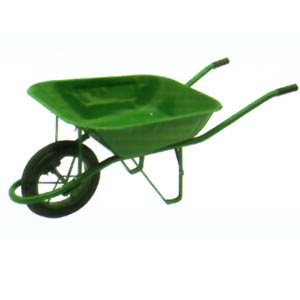Wheelbarrow

Hans from Traverse City, Michigan, called the show last Tuesday to propose a new piece of folk etymology. If enough people pick up on it, it will soon show up in your home as a forwarded e-mail.
Hans was doing some yard work, in the course of which he used a wheelbarrow. His whimsical speculation was that the barrow in wheelbarrow is actually a corruption of burro, the pack animal. After all, both are used to transport materials. Over the course of centuries, he speculates, the word burro was misheard, misspelled, and otherwise mangled until the transformation was complete.
As Fritz told his mother after his brother fell over a precipice, “Look, Ma, no Hans!”
The Oxford English Dictionary will have none of this. Instead, it soberly reminds us that barrow comes from an Old English word meaning” to bear or to carry,” and it showed up in print as barewe in the year 1300. The earliest model was a framework with handles projecting fore and aft so that two men could carry things. To distinguish it from a wheelbarrow, it was called a hand-barrow.
The spelling barrow was also used for several wildly unrelated items:
• a mountain or a hill
• a gravemound formed from dirt or stones
• a castrated boar
• a conical basket into which wet salt is placed to drain
• A long sleeveless flannel garment for infants
Of course, those in the know realize that the original spelling was wheelborrow, and that it targeted the practice of neighbors who use your yard equipment, then forget to return it.
SIDEBAR: burrito recipes
SIDEBAR: Listen to In The Valley Of The Shadow Of The Handbarrow and other St. Paul bands. (Go to August 7, 2005.)
http://www.publicradio.org/tools/media/player/minnesota/radio/programs/local_music_with_chris_roberts/2005/08/08_lm.ram


Comments